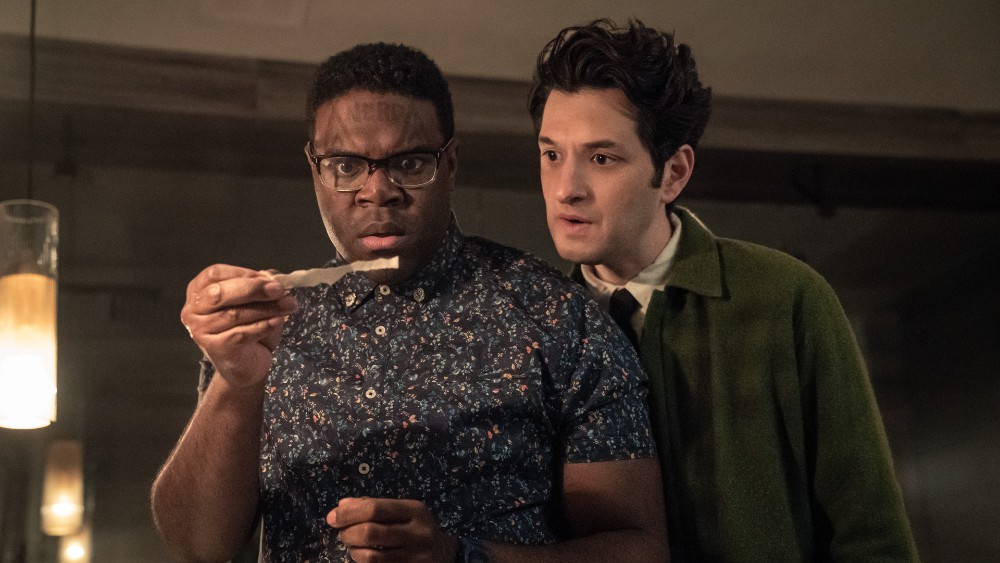
Composer Daniel Pemberton has been exceedingly busy the past few years despite the world being fully immersed in a pandemic for the last two. Since 1994, Pemberton has been one of Hollywood’s go-to composers for film and television, and in 2021, he was nominated for his first Oscar — not for one of his terrific scores but for co-writing “Hear My Voice” with Celeste for The Trial of the Chicago 7, which hailed from his regular collaborator, Aaron Sorkin.
In addition to Chicago 7 and Sorkin’s 2021 follow-up, Being the Ricardos, Pemberton has been busy writing music for Christopher Miller and Phil Lord’s comedy series The Afterparty, a murder mystery boasting a star-studded ensemble in which each episode tackles a different film genre. Pemberton also scored the British spy series Slow Horses starring Gary Oldman, which led to an unprecedented collaboration with Rolling Stones frontman Mick Jagger for the show’s theme song. If that wasn’t enough, Pemberton also composed the score and wrote the song “Good Tonight” for DreamWorks Animation’s theatrical hit The Bad Guys.
Below the Line jumped on the phone with Pemberton last week to talk about these very different projects, although the interview was cut short since he had to run for an L.A. concert with an orchestra performing his music from the National Geographic series Welcome to Earth.

Below the Line: Between the two Apple series and The Bad Guys doing so well in theaters, you’ve really had a pretty decent last couple months. Before we get to those projects, I’d love to learn more about your background. Did you go to school for music or composing?
Daniel Pemberton: Basically, I kind of got really into electronic music when I was a teenager, and I made a record when I was 16 called Bedroom. It was weird, avant-garde electronic music, and then a director heard it, and he asked me to do a TV documentary he was making, a guy named Paul Wilmshurst. I just did that after school, finished my homework, so I could this TV scoring a go. He liked it. I got another one, and then I got another one. I just kind of carried on from there. I’ve just been kind of making it up ever since then.
BTL: Did you play piano or keyboards as well, or just dabble with electronics?
Pemberton: Yeah, I’m an okay piano player and a bad guitarist.
BTL: I don’t know the time frame for scoring The After Party, Slow Horses, and The Bad Guys. Do you remember the order in which they were done or were they all mixed together?
Pemberton: Oh, man. I can’t remember, because there was COVID, and there was all kinds of stuff going on. Everything got moved around like crazy. I mean, the thing that’s good is I always tried to do projects that are quite different from each other, so you could sort of jump between things, and you’re entering very different worlds. I remember doing Afterparty, and I actually got COVID during Afterparty. I was really ill, and I was thinking, ‘Wow, imagine if I die,’ but I would still get my cues done and delivered on time it turns out. Even if I thought I was dying, I would get my cues delivered, which I thought was kind of interesting.
BTL: Do you tend to do demos of your cues and ideas before going into the studio to record them?
Pemberton: Every project is quite different. With Slow Horses, for instance, I spent a long time developing the sound world. Slow Horses‘ sound world is very distinctive and unique, and that was a lot of research and development to build unusual sounds. I wanted that score to feel like… the series is about spies that are outsiders and slightly crap and a bit rough around the edges. I wanted the score to have that kind of rawness and sort of wonky feel, whereas the MI5 world was very slick electronic. Something like that, for instance, what’s in the series is what I made while I working. Whereas if you look at Afterparty, I do demos and then we can record them with an orchestra, so every project is slightly different.
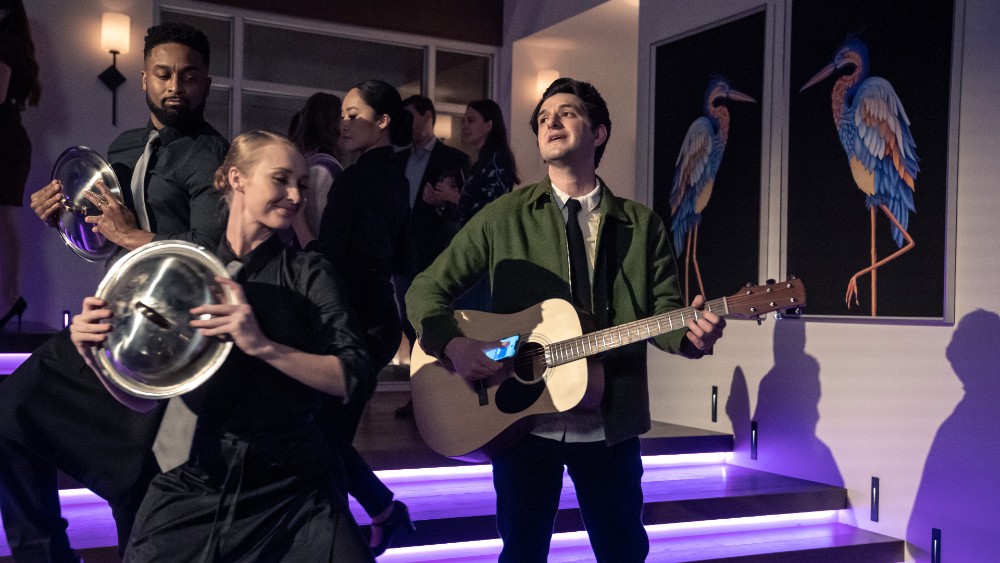
BTL: Did you have a connection to Chris or Phil on Afterparty, and I’m not sure who showruns Slow Horses, but had you worked with them before on something else?
Pemberton: For Afterparty, Chris and Phil are really good friends of mine. We’ve worked together before on Spider-Man: Into the Spider-Verse. We were kind of friends anyway, just because I met them years ago and we really got on. I did Spider-Man: Into the Spider-Verse with them, and then Chris asked me to come and do Afterparty. With Slow Horses, it was this Gary Oldman series that was made in Britain, so director James Hawes was a key figure in that show, making it work the way it does.
BTL: What did Chris tell you about The Afterparty and what was needed, considering that each episode was going to be a different genre?
Pemberton: Chris was like, ‘We’re doing a murder mystery show.’ I’m like, ‘Oh, great. That sounds fun,’ and he says, ‘Yeah, it’s all set around this school reunion, but here’s the other thing: Every episode and every character is told through a different film genre. And you’ve gotta do all the music for the film genres, as well, and make it sound really authentic. And then there’ll be some songs you have to produce.’ Yeah, it was crazy. Afterparty was one of the most demanding, challenging, TV series projects I’ve ever had to work on, because it was like scoring 15 different shows all at once.
BTL: Were they shooting and finishing one episode at a time and then sending you the edit to finish scoring? How did that work?
Pemberton: The shows were being edited in tandem with a great editor called Joel Negron, and with Afterparty, we had to begin with a thematic world for mystery and detective and then, we had all these different genres, like thriller, rom-com, kids’ film, animation, David Lynch-style movies. For me, I would try to approach each of those different genres in a way that felt like the way a composer on those projects would approach them. The way I’d approach a thriller, which is a very orchestral kind of score, would be completely different from the way I’d do the David Lynch moments, which were all based around tape manipulation and slowed-down samples.
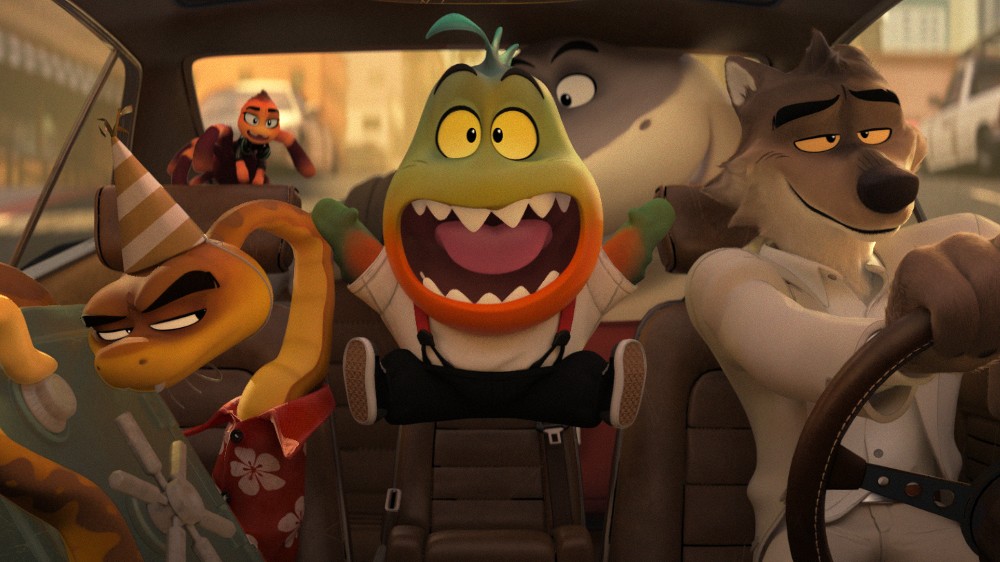
BTL: Are you generally looking for projects like that where you can do different things and explore different musical styles? It that one of the driving forces behind what projects you do when working with new people? For instance, when you’ve worked with Aaron Sorkin, each of those movies has a different feel from the music you provide.
Pemberton: Every time I do something, I kind of want to do something new that feels like you’re doing something unexpected. If you see one of my projects, I don’t want people to know what they’re gonna get. It always makes the excitement of what it’s gonna be. If you talk about The Bad Guys, that sounds completely different to Slow Horses, even though in some ways, they both have espionage elements. I’m always trying to make each sound world very unique for that project. And yeah, I like doing things which are different each time, like I’m working on Enola Holmes 2 at the moment, which is very different to those other projects.
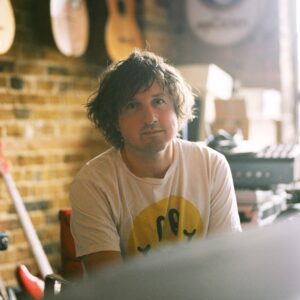
BTL: You mentioned COVID earlier, so how has it been making all this music and recording orchestra and bands and things like that.
Pemberton: I just embraced the fact that I was gonna be locked in my room and had to work that way for a lot of it. I did this series called Welcome to Earth, which was this thing with Darren Aronofsky, and that, I decided to go very electronic and very sample-based, because I was going to be stuck in my room and I couldn’t leave. As a composer, it’s fun to adapt to problems. Limited parameters can kind of make exciting music, so I like trying to force that kind of stuff onto the way I work sometimes.
BTL: You mentioned doing demos, so for some of these projects, do you write music in advance for them to edit with or have something to start with?
Pemberton: Every film is different, but like some films, I write tons of music before they even shoot stuff, and they’ll take it on set. Some things come in very late. I do like coming in during the script stage and start writing alongside the film and then feeding stuff to the edit as they go, and that’s the way I normally work. I normally work very closely with the filmmakers and the editors, so we’re all working together, and that way you can make stuff that feels more unusual.
BTL: With The Bad Guys, as an example. Being an animated project, they were probably working on that for three or four years in different stages, so is that something you’d also be involved with that from the very beginning as well?
Pemberton: I was on Bad Guys for a long, long stretch, because that was a project that got pushed due to COVID. But there were really important musical moments in that film like the song in the middle, “Good Tonight,” and they had to animate that entire sequence around whatever I wrote, so I was involved very early on with that movie, because music was quite a key part of a number of scenes throughout the film.
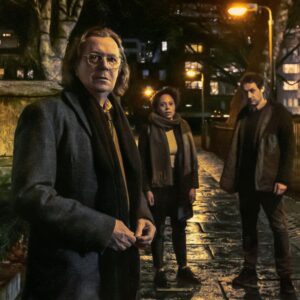
BTL: You’re a bit of an anomaly among film composers, since you also write songs, including one you worked on with Mick Jagger for Slow Horses. How did that come about, and how did you two work together?
Pemberton: That was one of the most amazing things about that project. I’d been writing the score and creating this sound world, and we talked about trying to turn that into a song for the theme tune. We had a great music supervisor, Catherine Grieves, and director, James Hawes, and we all talked about who we’d like. James was like, ‘I’d love to get Mick Jagger,’ which I thought was crazy. I thought we’d never get it, but Catherine had a connection. So we reached out to Mick Jagger’s people, and he was really quite interested. I had to do a presentation with the track and did a Zoom call with him, and we seemed to get on real well, and a couple days later, he’s like, ‘Let’s do it.’
I worked with Mick whenever we’d get some time with him, and he was amazing to work with. He’s got such a phenomenal, iconic voice, and just nailed the show with his lyrics, right from the very first thing he sent me. He sent me an iPhone demo of his vocals. Straight away I’m like, ‘Holy shit, he’s got the entire show down in like 30 seconds!’ I really think it’s one of the great theme tunes for a show with a song that really encapsulates everything about the show. I just feel super-privileged to have had that moment with him.
BTL: Did you also write some songs for The Afterparty, as well?
Pemberton: No, on Afterparty, I just produced those songs. They were written by [Jack Dolgen and Jonathan Frederick Lajoie]. With those songs, I was just doing all the production and the arrangement on them. But then, in Bad Guys, I wrote a bunch of songs and lyrics as well with some other people. But every project is a bit different, and that’s what I like.
BTL: You’ve generally been bouncing between TV series and film, so how are you balancing all that stuff, and do you like finishing one project before going onto something else?
Pemberton: I love concentrating on one project, but it’s so hard, because schedules move, like COVID changed so many things. I’ve never known a single film to stick to a schedule, so you just have to kind of ride it. Sometimes, it’s really intense, and sometimes, you’ve got some space.
Season 1 of both The Afterparty and Slow Horses are now streaming Apple TV+, while The Bad Guys is still playing in select theaters and can be watched on VOD as well as Peacock.





